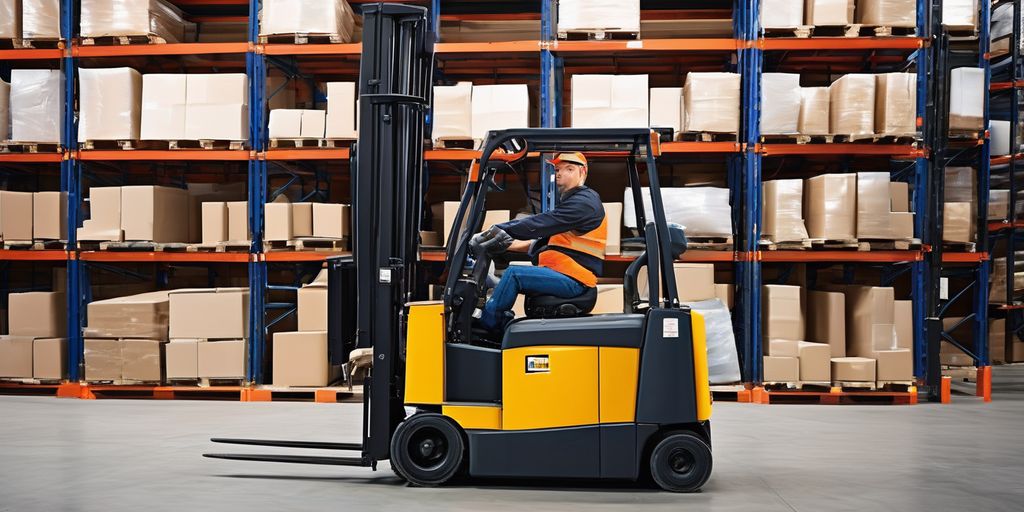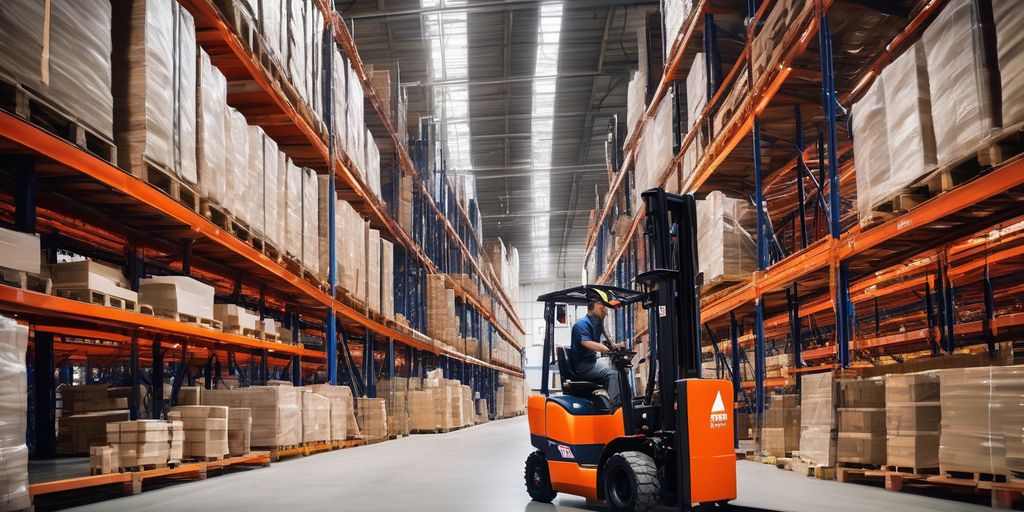In the ever-evolving world of material handling, forklifts play a vital role. Businesses frequently face the dilemma of choosing between electric and gas-powered forklifts, each with its own set of pros and cons. This article delves into the key aspects of both types, exploring their environmental impact, operational efficiency, maintenance, cost analysis, and future trends to help make an informed decision.
Key Takeaways
- Electric forklifts are eco-friendly, offering zero emissions and quieter operation, ideal for indoor use.
- Gas-powered forklifts provide robust performance and versatility, suitable for varied weather conditions and heavier loads.
- Initial costs for gas-powered forklifts are generally lower, but electric forklifts may offer lower long-term operating costs due to less maintenance.
- Future trends indicate advancements in battery technology and fuel efficiency for both types of forklifts, potentially altering their cost-effectiveness and environmental impact.
- When selecting a forklift, consider specific business needs, operational environments, and a thorough cost-benefit analysis to determine the most suitable option.
Understanding Electric and Gas-Powered Forklifts

Key Features of Electric Forklifts
Electric forklifts are powered by batteries, making them an eco-friendly choice. They are known for their quiet operation and zero emissions. Key features include:
- Lower operating costs due to reduced fuel expenses and fewer moving parts.
- Enhanced maneuverability and compact design suitable for indoor use.
- Dependence on battery life and charging infrastructure.
Key Features of Gas-Powered Forklifts
Gas-powered forklifts rely on internal combustion engines using propane, natural gas, or diesel. They are robust and versatile, suitable for a wide range of applications. Key features include:
- Longer runtime and no need for extended charging periods.
- Better performance in varied weather conditions.
- Higher initial costs but potentially lower maintenance due to simpler technology.
Comparative Overview
When comparing electric and gas-powered forklifts, it's essential to consider the specific needs of your operation. Electric models offer sustainability and lower long-term costs, while gas models provide flexibility and high performance in demanding environments. Choosing the right type involves aligning features with operational needs for efficiency and safety.
Environmental Impact and Sustainability

Emissions and Air Quality
Electric forklifts are celebrated for their zero emissions, making them a superior choice for indoor environments and areas with strict air quality regulations. In contrast, gas-powered forklifts emit pollutants like CO2 and NOx, which can significantly affect air quality, especially in enclosed spaces.
Energy Efficiency
Electric forklifts are more energy-efficient than their gas-powered counterparts. They convert over 90% of electrical energy into motion, while gas forklifts are less efficient due to the energy lost in combustion and heat. This efficiency not only reduces energy costs but also minimizes the environmental footprint.
Sustainability Practices
- Transition to electric forklifts as part of a broader sustainability strategy.
- Implement regular maintenance schedules to ensure optimal performance and longevity.
- Educate employees on the benefits of using electric forklifts and proper operational techniques.
By focusing on sustainability practices, businesses can enhance their operational efficiency while contributing positively to environmental conservation.
Operational Efficiency and Performance

Load Handling Capabilities
Electric forklifts are known for their robust construction and reliable performance, often exceeding the lifespan of their gasoline counterparts. This translates to a longer return on investment and minimizes the need for frequent replacements. Gasoline forklifts shine when it comes to performance in diverse weather conditions, offering a distinct advantage. They can function reliably across a wider range of conditions, ensuring consistent performance in hot summers, frigid winters, or unpredictable weather shifts.
Adaptability to Different Environments
While electric forklifts excel in indoor operations and sustainability, they may face limitations in extreme outdoor conditions. Gasoline forklifts, on the other hand, are more versatile in handling different environmental settings without performance degradation. This makes them suitable for businesses that operate in a variety of outdoor conditions.
Operational Costs
Electric forklifts generally have lower operating costs due to their energy efficiency and less frequent maintenance needs. However, the initial investment for electric models can be higher compared to gasoline forklifts. Understanding the total cost of ownership, including maintenance and energy costs, is crucial for making an informed decision.
- Lower operating costs for electric forklifts
- Higher initial cost for electric models
- Gasoline forklifts may incur higher fuel and maintenance costs over time
Maintenance and Longevity

Maintenance Requirements
Electric forklifts are known for their less frequent maintenance needs due to simpler electric motors with fewer moving parts. This results in longer service intervals and reduced mechanical repairs. In contrast, gas-powered forklifts require more regular maintenance due to their complex combustion engines. It's recommended that forklifts are usually serviced at least every 6 months to ensure optimal performance.
Durability and Lifespan
Both electric and gas-powered forklifts offer significant durability, but electric models generally have a longer lifespan. The average forklift lasts up to 10,000 pedal hours, with some brands like Toyota potentially reaching up to 20,000 pedal hours. Proper maintenance plays a crucial role in maximizing the service life of both types of forklifts.
Ease of Repair
Electric forklifts benefit from the standardization and similarity of parts to other electric vehicles, making them easier to repair. Gas-powered forklifts, while robust, often require specialized knowledge due to the intricacies of their engines. Ensuring access to skilled technicians is essential for maintaining operational efficiency.
Cost Analysis

Initial Investment
Electric forklifts generally have a higher initial purchase price compared to gas-powered forklifts. However, this initial cost is often offset by lower long-term operating expenses and maintenance costs.
Long-Term Operating Costs
Electric forklifts are known for their cost efficiency in the long run. They require less maintenance and have lower fuel costs since they run on electricity. In contrast, gas-powered forklifts incur higher fuel expenses and maintenance needs over time.
Resale Value
Electric forklifts tend to maintain a better resale value due to their longevity and lower operational costs. This makes them a more attractive option for businesses looking to maximize their return on investment.
Decision-Making Factors

Assessing Business Needs
When deciding which forklift best suits your needs, it is vital to consider several factors, such as the type of load to be moved, the working environment, and the specific tasks your forklift will perform. Electric forklifts are ideal for indoor use, while gas forklifts excel in outdoor, heavy-duty applications. Ergonomics and comfort are crucial for operator efficiency and safety.
Choosing the Right Forklift for Your Environment
Evaluate the operational environment to ensure the forklift can perform effectively. Electric forklifts require a stable power source and are best for operations with defined shifts. Gas forklifts, on the other hand, are suitable for round-the-clock operations and do not depend on charging infrastructure. Consider the physical requirements and whether your environment can support the necessary infrastructure for gas forklifts, such as ventilation due to emissions.
Cost-Benefit Analysis
Assess your budget, including initial investment and long-term operating costs. Consider your return on investment (ROI). Electric forklifts generally require less maintenance, aligning better with eco-friendly goals if sustainability is a priority. Evaluate the total cost of ownership (TCO), factoring in fuel, maintenance, and other ongoing expenses. A test drive can provide insights into handling, comfort, and performance, aiding in a more informed decision.
Future Trends in Forklift Technology

Advancements in Electric Forklifts
The forklift industry has experienced a shift in sales, with electric forklifts now accounting for nearly 60% of the market. Electric forklifts are rising in popularity due to advances in technology that allow them to operate more comparably to internal combustion engine forklifts in regards to performance and run time. The emergence of fast-charging capabilities, higher-voltage outputs, and new and improved battery, pump, and motor technologies are some of the reasons for these advancements.
Innovations in Gas-Powered Forklifts
Gas-powered forklifts continue to evolve with enhancements that improve their efficiency and environmental footprint. Innovations such as more efficient fuel systems and emissions-reducing technologies help these forklifts remain competitive. Additionally, developments in materials and engineering have led to lighter, more durable gas-powered forklifts.
Market Predictions
The forklift market is expected to see significant growth and transformation in the coming years, driven by industrial expansion and technological advancements. Predictions suggest that both electric and gas-powered forklifts will see innovations that enhance their performance and sustainability, making them more appealing to a broader range of industries.
Conclusion
In conclusion, the choice between electric and gas-powered forklifts depends heavily on specific operational needs and environmental considerations. Electric forklifts offer the benefits of being eco-friendly, quieter, and less costly in terms of maintenance, making them ideal for indoor use and operations in sensitive environments. On the other hand, gas-powered forklifts excel in outdoor conditions, provide longer runtimes, and often have lower initial costs. Each type has its distinct advantages and challenges, and the decision should be based on a thorough analysis of your business's specific requirements, operational context, and sustainability goals. This balanced approach will help ensure that you select the most appropriate forklift type that aligns with your operational needs and environmental responsibilities.
Frequently Asked Questions
What are the main differences between electric and gas-powered forklifts?
Electric forklifts are powered by batteries and are known for their eco-friendliness, quiet operation, and lower operating costs. Gas-powered forklifts, including those running on propane or diesel, offer robust performance and are better suited for varied weather conditions and continuous operation.
Which type of forklift is more environmentally friendly?
Electric forklifts are more environmentally friendly as they produce zero emissions and reduce the risk of contamination in sensitive environments, making them ideal for indoor use and areas where air quality is a concern.
What are the maintenance requirements for each type of forklift?
Electric forklifts generally require less maintenance due to fewer moving parts and no need for fuel-related services. Gas-powered forklifts have more complex engines that may require more frequent maintenance and checks.
How do the operational costs of electric and gas-powered forklifts compare?
Electric forklifts typically have lower operational costs because of reduced energy expenses and maintenance needs. However, their initial investment can be higher than gas-powered forklifts, which have lower upfront costs but higher fuel and maintenance expenses over time.
Which forklift type offers better performance in outdoor or rugged environments?
Gas-powered forklifts are generally better suited for outdoor and rugged environments due to their robust construction and ability to operate effectively in a variety of weather conditions.
How should a business decide between an electric and a gas-powered forklift?
The decision should be based on specific business needs such as application environment, cost considerations, performance requirements, and environmental impact. Assessing these factors will help determine the most suitable forklift type for a particular operation.




Leave a comment
This site is protected by hCaptcha and the hCaptcha Privacy Policy and Terms of Service apply.